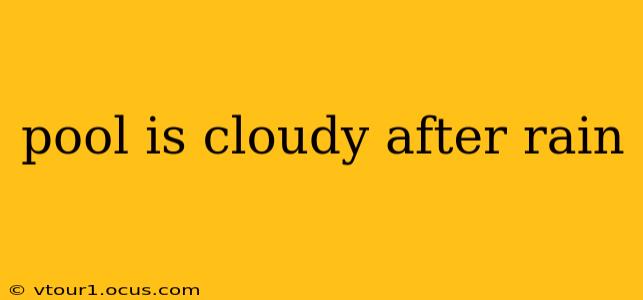Rain can wreak havoc on your pristine swimming pool, leaving you with cloudy, murky water. This isn't just unsightly; it can also indicate potential problems with your pool's chemistry and filtration system. Let's dive into the common causes and effective solutions for clearing up your cloudy pool after a rainfall.
Why is My Pool Cloudy After It Rains?
The clouding of your pool water after a rain shower is usually due to a combination of factors, all stemming from the rain itself.
-
Contaminants: Rainfall washes debris—leaves, dirt, pollen, insects, and other organic matter—into your pool. This influx of contaminants overwhelms your filtration system, leading to cloudy water. The heavier the rainfall, the more significant the contamination.
-
Diluted Chemicals: Rainwater dilutes the chemical balance in your pool. This can disrupt the proper levels of chlorine, alkalinity, and pH, hindering the water's ability to stay clear. Lowered chlorine levels, in particular, allow algae and bacteria to thrive, contributing to cloudiness.
-
Increased Total Dissolved Solids (TDS): Rainwater isn't pure; it can contain minerals and other dissolved solids that accumulate in your pool water, increasing the TDS and affecting clarity.
-
Sediment and Debris: Depending on your pool's surroundings, rainwater can carry sediment and fine particles from the ground or nearby surfaces, making the water appear cloudy.
How to Clear Cloudy Pool Water After Rain
Addressing a cloudy pool after rain requires a multi-pronged approach focusing on cleaning, filtration, and chemical balancing.
1. Thoroughly Clean Your Pool:
Before you even consider chemical adjustments, remove as much visible debris as possible. This involves:
- Skimming: Use your pool skimmer net to remove leaves, twigs, and larger debris from the surface.
- Vacuuming: Vacuum the pool floor and walls to collect settled sediment and smaller particles. Consider using a pool vacuum with a leaf-catcher bag for more efficient debris removal.
2. Check and Adjust Your Pool's Filtration System:
Your filtration system is crucial in clearing cloudy water.
- Backwash: Backwash your filter to remove trapped debris. How often you need to do this depends on your filter type and the severity of the contamination. Consult your filter's manual for specific instructions.
- Check Filter Pressure: Ensure your filter is operating at the correct pressure. A significant increase in pressure indicates a clogged filter needing cleaning or replacement.
- Run the Pump: Run your pump for an extended period—at least 24 hours—to allow the filtration system to work its magic and remove suspended particles.
3. Balance Your Pool Chemicals:
Testing your water is essential. Use a reliable test kit to check the levels of:
- Chlorine: Ensure adequate free chlorine levels to kill bacteria and algae. If levels are low, add chlorine according to the instructions on your chosen product.
- pH: Adjust pH to the optimal range (7.2-7.8). High or low pH can interfere with chlorine's effectiveness and contribute to cloudiness.
- Alkalinity: Maintain proper alkalinity levels (80-120 ppm). Alkalinity helps stabilize pH.
4. Consider Flocculants:
If your pool remains cloudy even after cleaning, balancing chemicals, and running the filter, a flocculant might be necessary. Flocculants clump together fine particles, allowing your filter to easily remove them. Follow the product instructions carefully. Remember to backwash your filter thoroughly after using a flocculant.
How Long Does It Take for a Cloudy Pool to Clear Up After Rain?
The time it takes for your pool to clear up depends on several factors: the severity of the contamination, the efficiency of your filtration system, and the accuracy of your chemical adjustments. In most cases, you should see improvement within 24-48 hours, but it might take longer for heavily contaminated pools.
What Causes Cloudy Water in a Pool After a Storm?
Heavy storms exacerbate the issues mentioned earlier. They introduce larger quantities of debris, more significant dilution of chemicals, and potentially higher levels of sediment and dissolved solids, making the clouding problem much more pronounced.
How Do I Prevent Cloudy Pool Water After Rain?
Proactive measures can help minimize clouding after rain:
- Use a Pool Cover: A pool cover significantly reduces the amount of debris entering your pool.
- Regular Maintenance: Consistent cleaning, chemical balancing, and filter maintenance are crucial for preventing cloudiness.
- Proper Chemical Levels: Maintaining the correct chemical balance before, during, and after rainfall ensures your pool is better equipped to handle contamination.
By following these steps and understanding the causes of cloudy pool water after rain, you can efficiently restore your pool to its crystal-clear condition, ensuring enjoyable swimming for you and your family. Remember, always consult your pool's instruction manual and seek professional advice if you are unsure about any aspect of pool maintenance.
